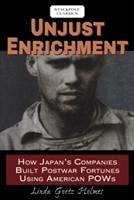
Unjust Enrichment

PAYBACK Punkte
11 °P sammeln!
The use of American POW's as slave labor by Japanese companies is the great unresolved issue of the Second World War in the Pacific. Unjust Enrichment provides a forum for American servicemen to tell their own stories, while Linda Holmes gives the reader the historic context to recognize the seriousness of the crimes. Bio: Linda Goetz Holmes has been interviewing and writing about World War II prisoners in the Pacific for over 30 years. She is the first historian appointed to the U.S. Government Interagency Working Group, formed in 1999 under the aegis of the National Archives to locate and de...
The use of American POW's as slave labor by Japanese companies is the great unresolved issue of the Second World War in the Pacific. Unjust Enrichment provides a forum for American servicemen to tell their own stories, while Linda Holmes gives the reader the historic context to recognize the seriousness of the crimes. Bio: Linda Goetz Holmes has been interviewing and writing about World War II prisoners in the Pacific for over 30 years. She is the first historian appointed to the U.S. Government Interagency Working Group, formed in 1999 under the aegis of the National Archives to locate and declassify material about World War II war crimes.



